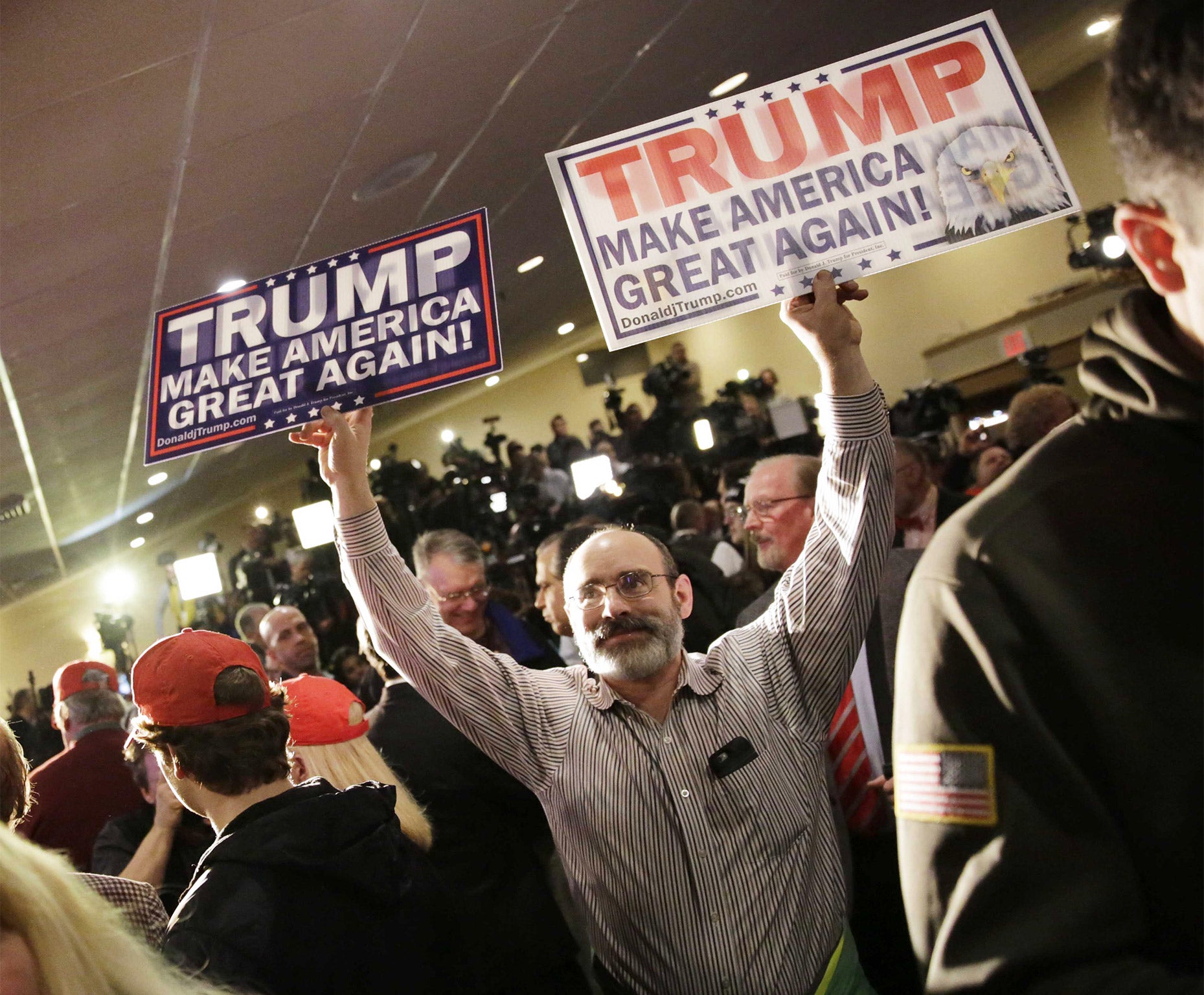A sure-fire way to get into the White House? Do a Donald Trump and go hard on the elite – while being a member of it at the same time
While Trump supporters disparage Obama’s mantra ‘Yes We Can’, they unwittingly endorse an unspoken, narcissistic Trump mantra, ‘Yes, I (and only I) Can’. The man himself summed up the “themes” of his campaign as “winning"

Your support helps us to tell the story
From reproductive rights to climate change to Big Tech, The Independent is on the ground when the story is developing. Whether it's investigating the financials of Elon Musk's pro-Trump PAC or producing our latest documentary, 'The A Word', which shines a light on the American women fighting for reproductive rights, we know how important it is to parse out the facts from the messaging.
At such a critical moment in US history, we need reporters on the ground. Your donation allows us to keep sending journalists to speak to both sides of the story.
The Independent is trusted by Americans across the entire political spectrum. And unlike many other quality news outlets, we choose not to lock Americans out of our reporting and analysis with paywalls. We believe quality journalism should be available to everyone, paid for by those who can afford it.
Your support makes all the difference.This week Trump won in New Hampshire with 35.3 per cent of the Republican candidate votes, turning his popularity in opinion polls into an electoral win. Trump’s rise was unanticipated by the political class – and speculation about his ‘inevitable’ demise has been grossly exaggerated.
Trump is not the first celebrity politician in America. Former actors Ronald Reagan and Arnold Schwarzenegger paved the way for celebrities in US politics. But where Reagan and Schwarzenegger spent considerable time trying to convince the media that they had serious ideas and had embarked on new careers in politics, Trump cares little about flattering the media and presents his presidential candidacy not as a new dimension to his public profile, but as an affirmation of his established profile.
As for Trump’s policies, the label ‘populist’ is an apt descriptor. Populists take advantage of people’s fears and offer crudely simplistic ‘solutions’; indeed, they will say almost anything to win over voters. Trump has referred to Mexican immigrants as ‘criminals’ and ‘rapists’ and supports the building of a wall to stop them ‘flooding’ into America. He has also called for ‘a total and complete shutdown of Muslims… entering the United States’. Trump exploits simmering anti-immigrant sentiments in contemporary America. A politician in Europe doing the same would be called out for being a ‘neo-fascist populist’. In the United States, however, political commentators tend to avoid such terminology. By referring to Trump’s proposals as ‘nativist’ or even ‘conservative’, US commentators underplay Trump’s bigotry and let him off the hook.
Trump also appeals to a large number of economically insecure Americans that, post great financial crash, angrily blame ‘elites’ in Washington and on Wall Street for their problems. The billionaire Trump masterfully differentiates himself from these elites. He chastises elites for their ‘stupid’ and unfair rules, but claims that he has overcome those rules, defeated The System and ‘won’ the economic game. Trump skilfully reflects the anger and economic aspirations of many Americans, but has few (if any) concrete policy proposals to improve their circumstances. In analyses of Trump’s popularity, his economic populism has received far less scrutiny than his xenophobic pronouncements.
There is a clear ‘cult of personality’ around Donald Trump. While Trump supporters disparage Obama’s mantra ‘Yes We Can’, they unwittingly endorse an unspoken, narcissistic Trump mantra, ‘Yes, I (and only I) Can’. The emptiness of Trump’s rhetoric was on display again in his New Hampshire victory speech in which he restated the ‘themes’ at the heart of his run for the presidency: “We are going to start winning again and we're going to win so much, you are going to be so happy, we are going to make America so great again, maybe greater than ever before. I love you all.”
The appeal of Trump is ultimately a reminder that, in the US, feelings of cultural and economic insecurity can be exploited by pandering to anti-immigrant and anti-elite prejudices. Trump pledges to ‘take America back’ from those who ‘threaten’ its future. This is the very definition of crude populism in action.
Join our commenting forum
Join thought-provoking conversations, follow other Independent readers and see their replies
Comments